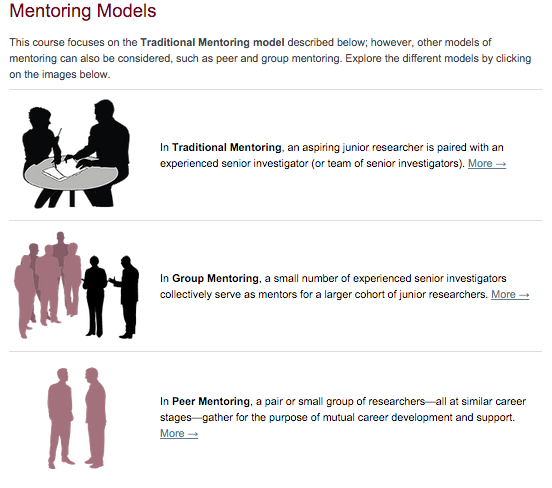Contributed by Anne Marie Weber-Main
In just two years, nearly 60 faculty members in the University of Minnesota’s Academic Health Center have taken part in its Mentoring Excellence Training Academy (META). This professional development program uniquely applies two training modalities—online self-study combined with facilitated small-group discussions—to improve the knowledge and skills of participating research mentors.
“We had a great experience several years ago introducing our faculty to the outstanding workshops provided by the well studied curriculum Mentor Training for Clinical & Translational Researchers,” said Dr. Anne Marie Weber-Main, a co-Director of the META and an NRMN Master Facilitator for Mentorship Training. “But we also recognized that 8 hours of in-person training is a significant time commitment. So we started thinking about how online learning could be used to reach a larger audience, and perhaps allow us to streamline the mentor training program.”
 In 2012, with support from their Clinical and Translational Science Institute, Dr. Weber-Main collaborated with other local colleagues to develop and launch a free, interactive, online, 90-minute module, Optimizing the Practice of Mentoring. To date, this module has been accessed by over 1,000 registrants from more than 175 institutions.
In 2012, with support from their Clinical and Translational Science Institute, Dr. Weber-Main collaborated with other local colleagues to develop and launch a free, interactive, online, 90-minute module, Optimizing the Practice of Mentoring. To date, this module has been accessed by over 1,000 registrants from more than 175 institutions.
“We assume that most people are applying Optimizing the Practice of Mentoring as a stand-alone training,” noted Weber-Main. Her team went a step further by bundling the online module with a smaller dose (5 hours vs. 8 hours) of the in-person curriculum. “The idea was that all participants would benefit from a preparatory learning experience that summarizes best practices gives them time to reflect on their own approaches to mentoring,” said Weber-Main.
As part of the META’s launch in 2015, the University of Minnesota team conducted a pilot randomized controlled trial of this hybrid multimodal modal approach. “We’re preparing the manuscript now, and are excited to share the data with the research community,” said Weber-Main. Key findings are that (1) the online module alone is effective at increasing participants’ self-reported mentoring knowledge and prompting an intention to change mentoring practice; (2) additional gains in both domains are observed after completion of the full intervention; and (3) participants value the online module for providing them with a common framework, a shared language, and a wealth of mentoring resources.
“Ultimately, institutions and programs want and need flexibility in their approaches to mentor training,” said Weber-Main. “We anticipate our findings will help illustrate the value of providing formal training to research mentors, and that this can be done effectively in a range of doses delivered through many different modalities.”